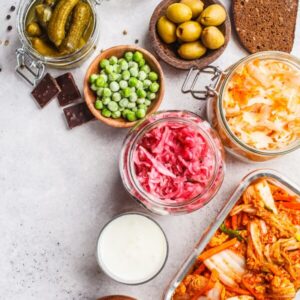The health benefits of fermented foods
Fermented foods have been around for centuries, and there’s a good reason why they’re still so popular today!
They’re delicious, versatile, and packed with health benefits! The fermentation process involves good bacteria, yeast, or fungi breaking down the sugars in food, creating beneficial substances like probiotics that can do wonders for your health.

What is fermentation?
Choice Australia states that fermentation is a metabolic process in which microorganisms such as bacteria, yeast or fungi convert organic compounds into alcohol or acids.
The fermentation process preserves food, adds microbes to the gut, increase nutrients and decreases anti-nutrients, makes food more digestible, changes taste, and decreases cooking time (something we love here at The Healthy Mummy).
Fermented food is also said to be beneficial for those with social anxiety. Studies have shown that the gut affects our mental health and it is only natural that fermented food, which benefits the gut, then reduces anxiety.
We dive into how gut health impacts your mental health here.
The health benefits of fermented foods
Happy Gut
Fermented foods are loaded with probiotics, the friendly bacteria that keep your digestive system in optimal shape.
Stronger Immune System
A healthy gut generally means a stronger immune system!
Better Nutrient Absorption
When foods are fermented, they help your body to soak up minerals like iron, calcium, and magnesium more easily.
Supports Your Mental Well-being
It’s called the “gut-brain connection,” and probiotics play a big role. They can help produce feel-good chemicals like serotonin, potentially reducing symptoms of anxiety and stress. Eating fermented foods might just put you in a better mood!
Fights Inflammation
Fermented foods have anti-inflammatory and antioxidant properties that can help keep inflammation in check.
Glowing Skin
A healthy gut can mean healthy skin! Eating fermented foods can help reduce skin issues like acne and eczema by lowering inflammation. There’s even a rise in skincare products with fermented ingredients, thanks to their ability to nourish and protect the skin barrier.

Try our Chicken Power Bowl – just 307 calories!
Delicious Fermented Foods to Try
- Yoghurt: Creamy and full of probiotics, it’s perfect for your gut and bones.
- Kefir: A tangy, drinkable yoghurt packed with probiotics and nutrients.
- Sauerkraut: Crunchy fermented cabbage that’s full of fibre and vitamins.
- Kimchi: A spicy Korean favourite made from fermented veggies, bursting with flavour and good bacteria.
- Miso: A savoury soybean paste, loaded with probiotics and used in soups and marinades.
- Tempeh: A protein-rich, nutty-tasting fermented soybean product.
- Kombucha: A fizzy fermented tea, rich in probiotics, antioxidants, and organic acids.
- Pickles: If they’re fermented (not just pickled in vinegar), they can be a tasty source of probiotics too!
Incorporating a variety of fermented foods into your diet can be an easy and delicious way to support your health, from improving digestion to boosting your immune system and beyond.

The verdict on fermented food
Fermented foods contain live microbes which give powerful effects on our bodies, specifically in the gut area.
Probiotics are found naturally in some fermented food giving your body improved digestion, fight against disease and raise your immunity levels.
See what this nutritionist says to do to beat the belly bloat, hint: it includes fermented food.
The best thing about fermented food is that you can make it the comfort of your own kitchen! Get the kids involved and start fermenting now!
Modern healthcare that believes in you
The Healthy Mummy is proud to partner with Moshy—an online women’s health clinic designed to help Australian women access the care they need, when they need it.
Moshy gives women a space to put their own health and wellness first, by connecting them with qualified doctors and healthcare practitioners.











